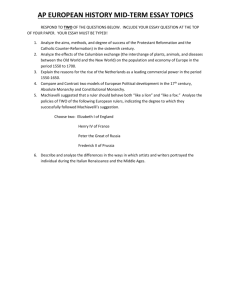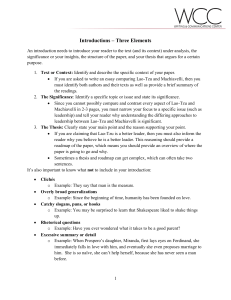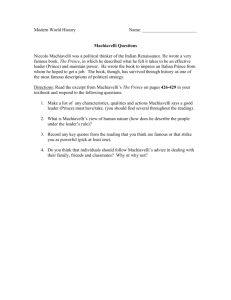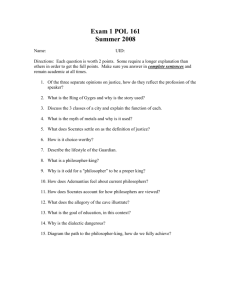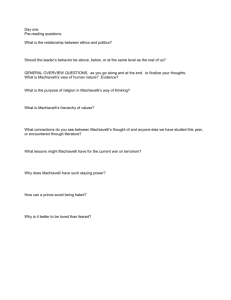Expository Essay- LIT 4433: Literature of Science and Technology
advertisement
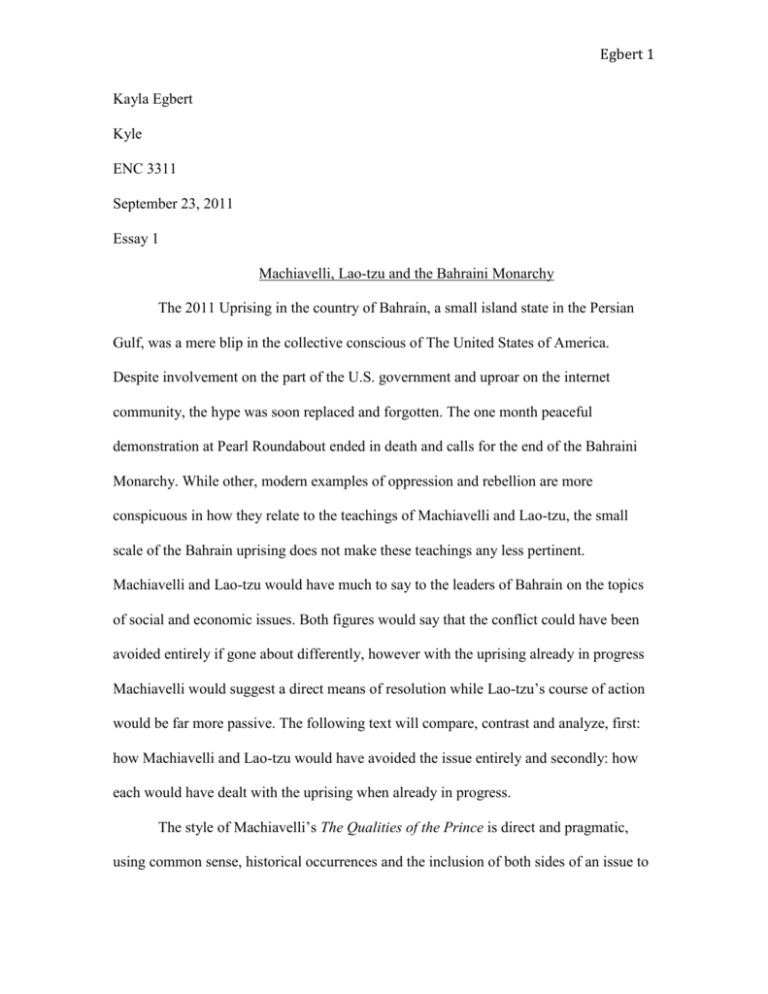
Egbert 1 Kayla Egbert Kyle ENC 3311 September 23, 2011 Essay 1 Machiavelli, Lao-tzu and the Bahraini Monarchy The 2011 Uprising in the country of Bahrain, a small island state in the Persian Gulf, was a mere blip in the collective conscious of The United States of America. Despite involvement on the part of the U.S. government and uproar on the internet community, the hype was soon replaced and forgotten. The one month peaceful demonstration at Pearl Roundabout ended in death and calls for the end of the Bahraini Monarchy. While other, modern examples of oppression and rebellion are more conspicuous in how they relate to the teachings of Machiavelli and Lao-tzu, the small scale of the Bahrain uprising does not make these teachings any less pertinent. Machiavelli and Lao-tzu would have much to say to the leaders of Bahrain on the topics of social and economic issues. Both figures would say that the conflict could have been avoided entirely if gone about differently, however with the uprising already in progress Machiavelli would suggest a direct means of resolution while Lao-tzu’s course of action would be far more passive. The following text will compare, contrast and analyze, first: how Machiavelli and Lao-tzu would have avoided the issue entirely and secondly: how each would have dealt with the uprising when already in progress. The style of Machiavelli’s The Qualities of the Prince is direct and pragmatic, using common sense, historical occurrences and the inclusion of both sides of an issue to Egbert 2 support his points. Mirroring his writing style, he encourages the prince to also be direct and pragmatic in his ruling. Machiavelli wrote The Qualities of the Prince with one major notion: “To secure power by direct and effective means” (Jacobus 37). Though the uprising has been resolved, the cumulative effects of the event are still taking place. The protestors are still dissatisfied with their government; Bahrain has not secured complete and stable power. What little power the monarchy does still hold, was by no means gathered in an effective manner. On being ready for war, Machiavelli encouraged the prince to constantly be aware so that ‘no unforeseen incident could arise for which he did not have the remedy’ (Jacobus 41). Due to this stance, Machiavelli would have done his best to avoid the uprising at Pearl Roundabout. The protestors at Pearl Roundabout were attempting to bring forward the unfair treatment of the Shia majority in regards to employment, housing, and infrastructure and the preferential treatment of the Sunnis. If the Bahrain Monarchy had been able to manipulate their people and keep them satisfied the uprising could have been prevented. To maintain satisfaction among his people, Machiavelli focused on not depriving them of their property and honor. If the Shia majority of Bahrain had felt that they were treated equally to the Sunnis, they would have nothing to rebel against. Machiavelli warned against conspiracies, that when the country is ill-organized and the people are hostile towards the government, everything and everyone must be feared (Jacobus 52). A major point of contention for the protestors on February 14th was the controversial Google Earth images, which showed that 95% of the country consisted of palaces and other estates belonging to the monarchy. Machiavelli says that a prince who spends his own money and that of his subjects must be economical; a prince who spends Egbert 3 the money of others must be generous (Jacobus 44). It is plain to see, the royalty of Bahrain was neither economical nor generous in their decision to use the money in this manner. The monarchy could have chosen to be more generous to keep the people happy. However, it is generosity which leads to hatred, which must be avoided at all costs, because generosity is quick to run out and leads to poverty. Lao-tzu’s text is intended for politicians and focuses on the virtues a good ruler must have with an antimaterialist view. The subtle poetic styling and ‘possible hidden meanings’ used by Lao-tzu mimic the governing knowledge he wishes to impart. Lao-tzu touts letting everything fall into place as the Tao resolves everything. The Bahraini government should have been ‘…in harmony with the Tao’ (Jacobus 28). When a country is in harmony with the Tao, the people are productive. A country which runs against the Tao will only ever be prepared for enmity. According to Thoughts from the Tao-te Ching, the Pearl Revolution occurred because the monarchy ruled too closely. The people would have been content if Bahrain had governed wisely, but the Shia became untrustworthy because they were not trusted. Counter to Machiavelli, Lao-tzu would have allowed the Shiite Muslims serve in the important political and military posts their government had blocked them from. Lao-tzu says that the government must “Let go of fixed plans and concepts and the world will govern itself” (Jacobus 29). In giving its people more access and leeway in regards to their own governing, Bahrain would be in keeping with the Tao. In addition to this, the Shia people have been provided with housing and infrastructure far below that of their fellow Sunni countrymen. The monarchy creates further disparity between their actions and Lao-tzu’s philosophies by drawing correlations between the rich prospering and the farmers losing Egbert 4 their land. The Google Earth images showing the monarchy’s vast palaces and estates would be directly contrary to Lao-tzu philosophies. This extravagance and irresponsibility of the upper class (Jacobus 29) is not in harmony with the Tao; the monarchy gave the poor ‘nowhere to turn’ (Jacobus 29) but to robbery and chaos. In the case that the uprising could not have been prevented, Machiavelli would have been far more effective in containing the issue. The original intention of the event was a planned, peaceful demonstration in the country’s financial district. The government’s response was heavy handed and led to much criticism from modern countries and human rights activists. The King of Bahrain declared martial law, instituting military rule by military authorities over the designated region, one month after the protestation had started. The government attempted to intimidate the opposition into submission with brutal crackdowns on unarmed protestors, midnight house raids in Shia neighborhoods, beatings at checkpoints and denial of medical care. Journalists who attempted to report human rights abuse claim to have received death threats or were arrested (Law, BBC). As can be seen in The Qualities of the Prince, Machiavelli is not opposed to cruelty or intimidation. However, Machiavelli would insist upon covering up the government’s brutality and maintaining the facade of fairness. To appear to be ‘merciful, faithful, humane’ and ‘forthright’ (Jacobus 49) is more important and more useful than actually having and practicing the qualities. He advised the prince that it is much safer to be feared than loved and, of course, that ‘one must consider the final result’ (Jacobus 49). At first the government accused the Shiite political groups, Al Wefaq National Islamic Society and Islamic Action Society, of “violating laws and harming ‘social peace and national unity’” (Chick, The Christian Science Monitor). Following Egbert 5 criticism from a US State Department spokesman, the statement was removed and replaced by a statement claiming the government would wait for further information before pursuing a course of action. Machiavelli would fault King Hamad of Bahrain for not holding firm in his decisions. Machiavelli enforces the point that in order to maintain position of power, a prince should never abandon ‘what is done’ for what should be done (Jacobus 42). According to Machiavelli, the error of the government would not lay in the exact actions themselves, but in how the government allowed the world to perceive them: “…it is necessary to know how to disguise this nature well and to be a great hypocrite and a liar” (Jacobus 48). Lao-tzu would have promoted a more hands off method of resolving the uprising. The King of Bahrain exemplified the antithesis of every single thing the Tao-te Ching aims to teach, “...simplicity, patience and compassion” (Jacobus 32). Those who govern and follow the Tao do not try to force issues for “Violence, even well intentioned, always rebounds upon oneself” (Jacobus 26). In the government’s violent clearing of what was a peaceful protest, they attempted to tamper with and improve the world and in accordance with Tao, ruined it (Jacobus 26). Lao-tzu’s most important question for King Hamad would be “If peace has been shattered, how can he be content?” (Jacobus 27). If the government had allowed freedom of ideas the demonstrations would have ended without violence and death, the protesters eventually returning home. The government created chaos by imposing its will. Lao-tzu would be appalled by the waffling of the government. A great nation is one that realizes, admits to and corrects its mistakes (Jacobus 31). The Bahrain government did no such thing, denying all accusations of torture, inhumanity and brutality. If a great country is not meant to meddle in the affairs of others, it too should Egbert 6 not allow meddling in their own affairs. Instead Bahrain caved to the opinions of outside forces. The Bahrain government’s handling of the 2011 uprising at Pearl Roundabout was brutal and tactless. Machiavelli would have insisted upon manipulating the Shiite people into believing their government was completely satisfying their social and economic needs. Machiavelli’s route would have been the most immediately effective. Lao-tzu would have taken a passive stance, not forcing the issue and allowing the people to work it out for themselves. Due to Bahrain’s long history of oppression, even if the current government attempted to follow the advice of Lao-tzu, the centuries of unrest could not be resolved by such a quick turnaround. The abrupt change in governing style would be more likely to be perceived as a weakness and potentially lead even more quickly to what seems to be the inevitable overthrow of the Bahraini monarchy. This is not the intention of either Lao-tzu or Machiavelli as both of their advice aims to keep the current government in power and maintain a content populace. Though Machiavelli’s advice would do for resolving the 2011 Uprising and maintaining a peaceful country in the short term, Lao-tzu’s advice would lead to a more viable governing institution in the long run. Egbert 7 Works Cited Chick, Kristen. "Bahrain backs off plan to ban opposition after US criticism." The Christian Science Monitor. 15 April 2011. Jacobus, Lee. "A World of Ideas". Boston: Bedford/St. Martins, 2010. Print. Law, Bill. "Police brutality turns Bahrain into 'island of fear'." bbc.co.uk. BBC, 6 April 2011.
